World Obesity at WHA 78 - driving action on obesity and NCDs
From 19 - 27 May, the World Obesity team joined our members and fellow health organisations at the 78th World Health Assembly (WHA) in Geneva to elevate action on obesity.
This WHA came at a critical time as countries prepare for the Fourth UN High-Level Meeting on noncommunicable diseases (NCDs) and Mental Health in September 2025.
The WHA is the decision-making body of the World Health Organization (WHO). Delegates from WHO Member States come together at an annual assembly at the UN headquarters in Geneva to discuss specific health topics. Whatever decision is made by Member States on the WHA will determine WHO's policies and priorities. Non-State Members, such as Civil Society Representatives, like World Obesity, are subject experts who can contribute to the science guiding WHO policies, but only Member States have the right to vote. World Obesity and other members provide input to and can influence decision-making through other forms (side events, meetings with Missions, delivering statements, in addition to participating in expert committees and in official relations activities).
The World Obesity team - Dr Simón Barquera, President; Johanna Ralston, CEO; Dr Angie Jackson-Morris, Director of Programme and Strategy; and Magdalena Wetzel, Head of Policy - were joined by World Obesity Treasurer, Jason Halford, representing ECPO, and lived experience advocates who together spent the week delivering statements, hosting, attending and speaking at side events, as well as holding insightful meetings with governments and partners.
Read on for some of the week's highlights.
World Heart Summit
At the World Heart Summit, our CEO, Johanna Ralston, participated in the launch of the 'Obesity and Cardiovascular Disease' report at a two-day summit that convened heart leaders from all over the world, ranging from American Heart Association’s Nancy Brown to Joseph Mucumbitsi of the Rwanda Heart Association.
The World Obesity Federation is proud to have supported the development of this important resource and echoes the report’s call for urgent, systems-level action to reduce the impact of obesity and cardiovascular disease on communities worldwide. With CVD remaining the world’s leading cause of death, and obesity emerging as a primary driver, the report urges leaders to prioritise obesity within broader NCD strategies and invest in scalable, equity-focused interventions.
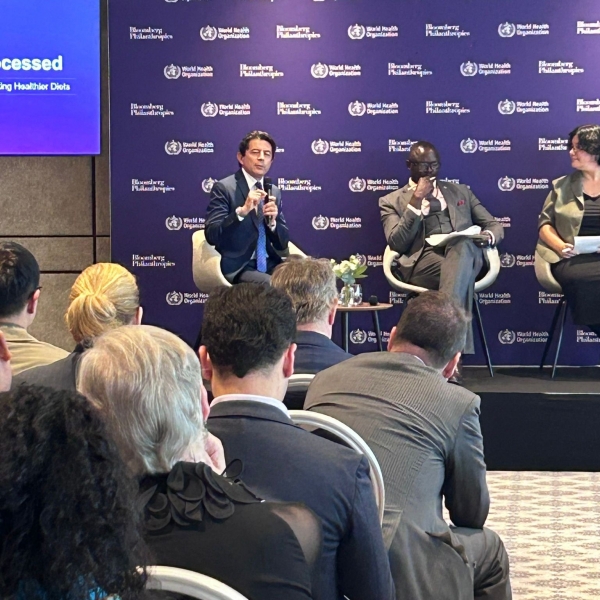

Spotlight on ultra-processed foods
The global increase in obesity prevalence has been concurrent with the worldwide rise in the production and marketing of ultra-processed foods (UPFs), which are energy-dense, rich in sugars, saturated/trans fats, and sodium. Food systems must deliver affordable, healthy, nutritious diets as part of coordinated efforts to halt the rise in obesity and address all forms of malnutrition.
Front-of-pack nutrition labelling (FOPL) has been recognised as a cost-effective policy to address the growth of obesity prevalence as well as other NCDs.
World’s Obesity President, Dr Simón Barquera, spoke on the panel of “Unpacking Ultra-Processed: The Role of Front-of-Pack Labelling in Promoting Healthier Diets”, an event moderated by author and expert Chris van Tulleken, and hosted by Bloomberg Philanthropies and the World Health Organization.

People with lived experience at the centre
Building on the advocacy training session for people living with obesity (PWLO) that we co-hosted with the Global Obesity Patient Alliance (GOPA) and the European Coalition for People living with Obesity (ECPO) on the sidelines of ECO 2025, the World Obesity team huddled with advocates with lived experience of obesity, including Ericka Cuzziol (Brazil), Dr Karen Sealey (Trinidad and Tobago), Ogweno Stephen (Kenya), Vicky Mooney (Ireland) and Yvette Raphael (South Africa), to discuss our messaging and strategy for the high-level meeting in September.
Additionally, we collaborated with fellow health organisations from the Global Obesity Coalition (comprising World Obesity, WHO, and UNICEF), the GASOL Foundation, European Coalition for People living with Obesity (ECPO) and Global Obesity Patient Alliance (GOPA).
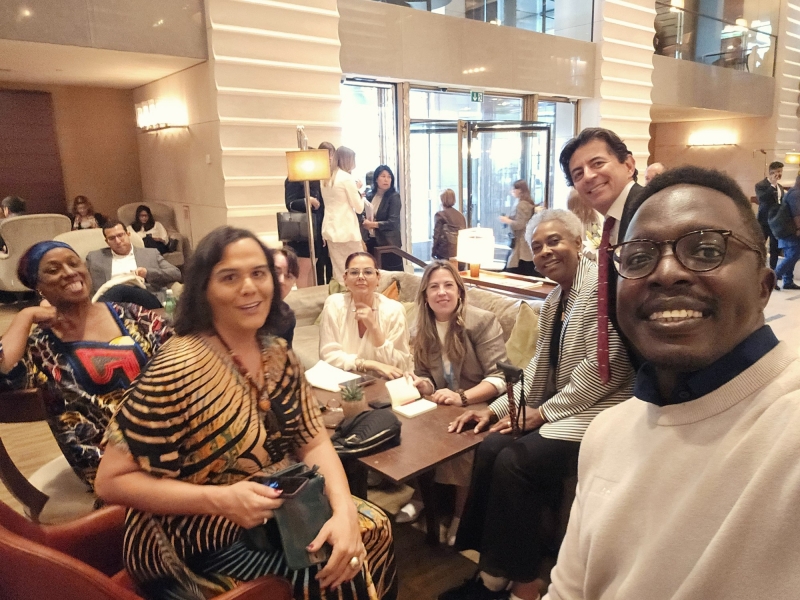
The Right(s) Approach: Driving Action on Obesity and NCDs
On 20 May, we hosted a dynamic event that brought together over 70 global partners to explore the systemic shifts needed across sectors - placing rights, equity and lived experience at the centre of the obesity and NCD response.
This discussion, led by lived experience advocates, focused on reimagining environments that uphold rights and health across the lifecourse and discussed how rights-based approaches to obesity can strengthen the broader response to NCDs and mental health to deliver a ‘double dividend’, drawing from lessons in HIV, integration, and dignity-centred care. This was a unique moment to listen, learn, and be challenged - by stories, evidence, and strategies that point to a better way forward.
Following an opening statement from Dr Francesca Celletti, Lead on Obesity at the World Health Organization, a video from UNICEF South Africa was shown featuring youth advocates from the 'Fix my Food' coalition. Opening comments from the Global Obesity Coalition (World Obesity, WHO and UNICEF) framed the concerning absence of lived experience at the centre of obesity agendas and set out priorities for changing the narrative.
We then held two panels: Achieving rights-affirming environments through the life course, moderated by Dr Karen Sealey, and joined by interventions from lived experience representatives, Yvette Raphael and Susie Birney; and a presentation by Mauro Brero, UNICEF.
The second panel, Delivering a double dividend on obesity and NCDs: the right approach was moderated by our Board member, Ogweno Stephen, and included presentations and insights from Vicky Mooney, ECPO, Dr Santi Gómez, Gasol Foundation, and Ericka Cuzziol, lived experience advocate.

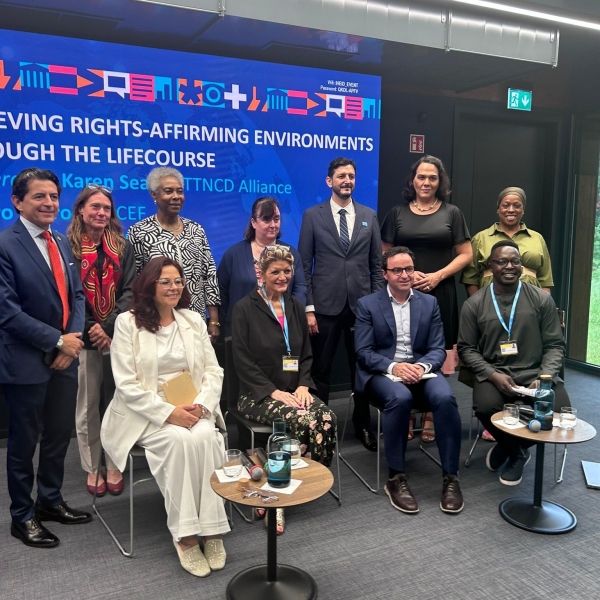
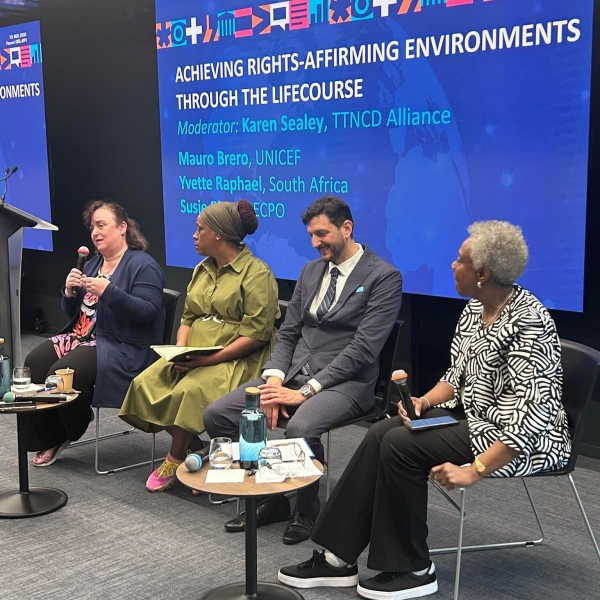
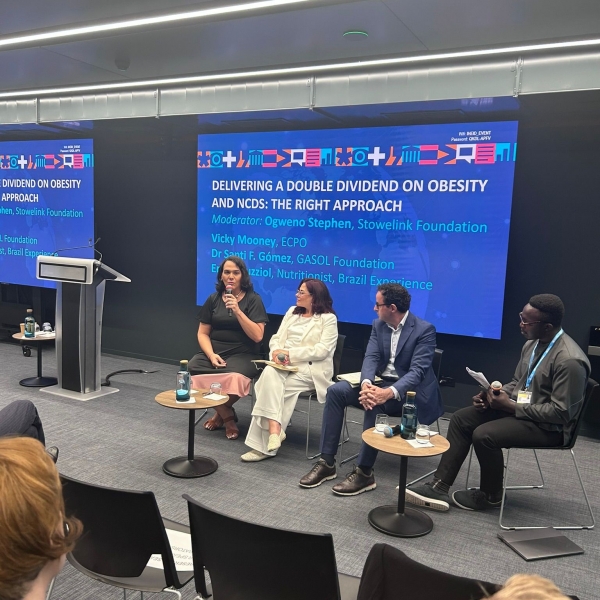
World Obesity’s President, Dr Simón Barquera, concluded the conversations with the closing remarks.
“Obesity remains under-prioritised globally, in national health systems and policy frameworks. As the world grapples with the escalating NCD crisis, addressing obesity must be at the core of an effective and sustainable response. Many of the same policies to prevent and manage obesity will also help reduce NCDs, making action on obesity a double-dividend ('win-win') strategy for healthier lives. The upcoming HLM must finally acknowledge obesity as a critical priority within the NCD response and translate this into concrete commitments.”
WHO Acceleration Plan to Stop Obesity
Obesity took centre stage at the United Nations building in Geneva during a high-level event on the WHO Acceleration Plan to Stop Obesity, hosted by the Ministries of Health of Spain and Mexico alongside WHO.
The World Obesity Federation’s President, Dr Simón Barquera, delivered powerful remarks on the vital role of civil society and World Obesity members in driving national and global progress on obesity prevention and care.
Ministers from front-runner countries, including Brunei, Brazil, Egypt, Malaysia and others, shared how they are implementing the WHO plan to address obesity as both a health and food systems issue.
We also heard from Tom Frieden of Resolve to Save Lives and Vicki Mooney, who brought the lived experience voice to the fore, reminding us of the human rights dimension of this challenge.
Other events
Along with the Ministry of Health of Brazil, Global Health Advocacy Incubator (GHAI) and several others, World Obesity was a co-sponsor of the event on the 'Monitoring Breast-milk Substitutes Digital Marketing'.
Our CEO, Johanna Ralston, also participated in an event hosted by the International Initiative for Pediatrics and Nutrition at Columbia University Irving Medical Center, the International Agency for Research on Cancer/World Health Organization (WHO), and the WHO Global Initiative for Childhood Cancer, titled 'Addressing Pediatric Non-Communicable Diseases: Building Systems-Based Approaches in Nutrition'.
World Obesity Statements to the 78th World Health Assembly
We delivered a number of statements on key agenda items, including a combined statement for:
- Agenda item 12: The role of the global coordination mechanism on the prevention and control of noncommunicable diseases in WHO’s work on multistakeholder engagement for the prevention and control of noncommunicable diseases: report on independent evaluation, and
- Agenda item 13.1: Follow-up to the political declaration of the third high-level meeting of the General Assembly on the prevention and control of non-communicable diseases
We also delivered a separate statement on Agenda item 13.9: The Global strategy for Women’s, Children’s and Adolescents’ Health (including a resolution on Regulating the digital marketing of breast-milk substitutes).
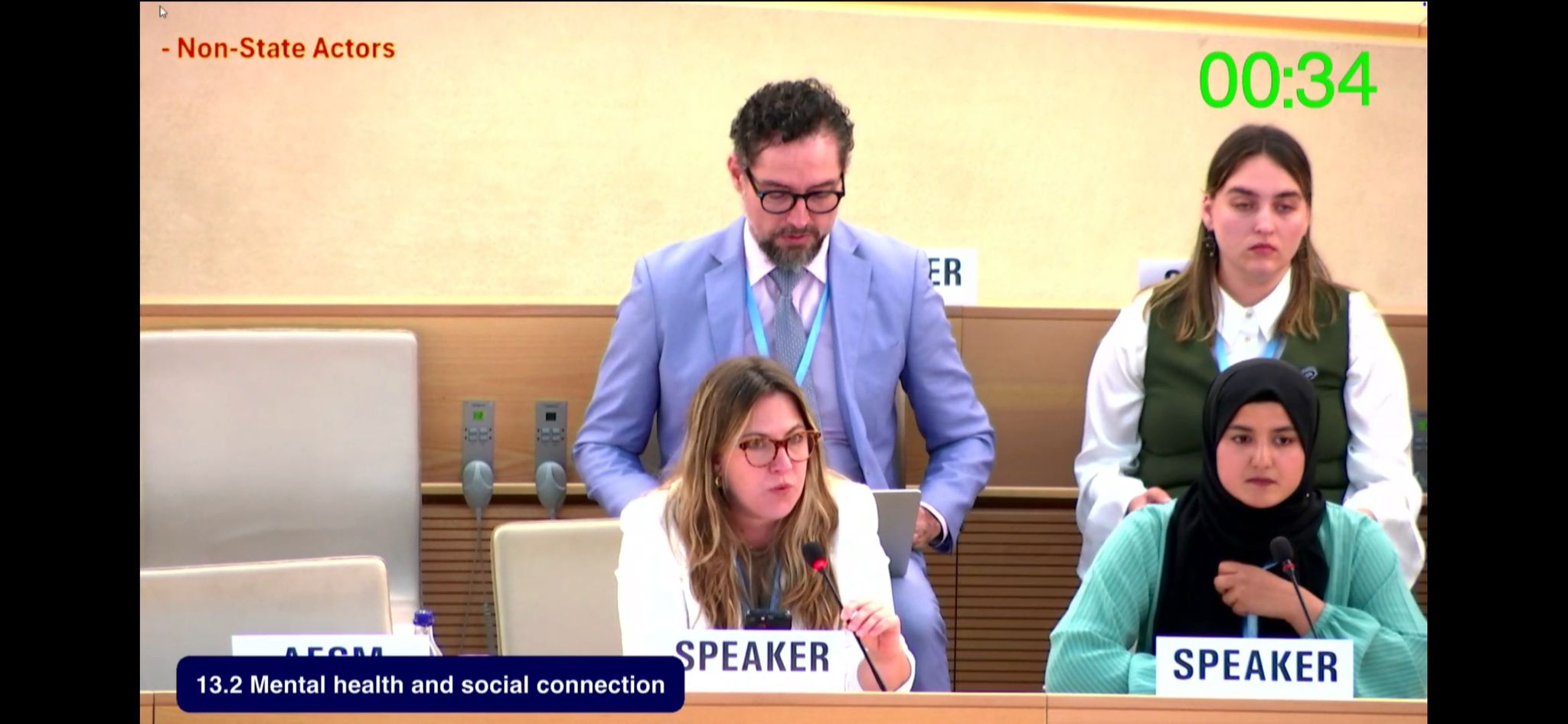
You can read and download our Statements here:
Related Resources
View allStatements Jun 02, 25
Statement to the 78th World Health Assembly - NCDs
Statements on agenda items 12 and 13.1 – Role of Global Coordination Mechanism (CGM) and Political Declaration on NCDs.
View ResourceStatements Jun 02, 25
Statement to the 78th World Health Assembly - Digital marketing of breast milk substitutes
Statement on agenda item 13.9 – Regulation of digital marketing of breast-milk substitutes
View ResourceContact Us
In the coming weeks and months we will be asking you to help us ensure strong language and response from the obesity community to the UN NCD agenda.
Please join us in making a difference!
Contact Us